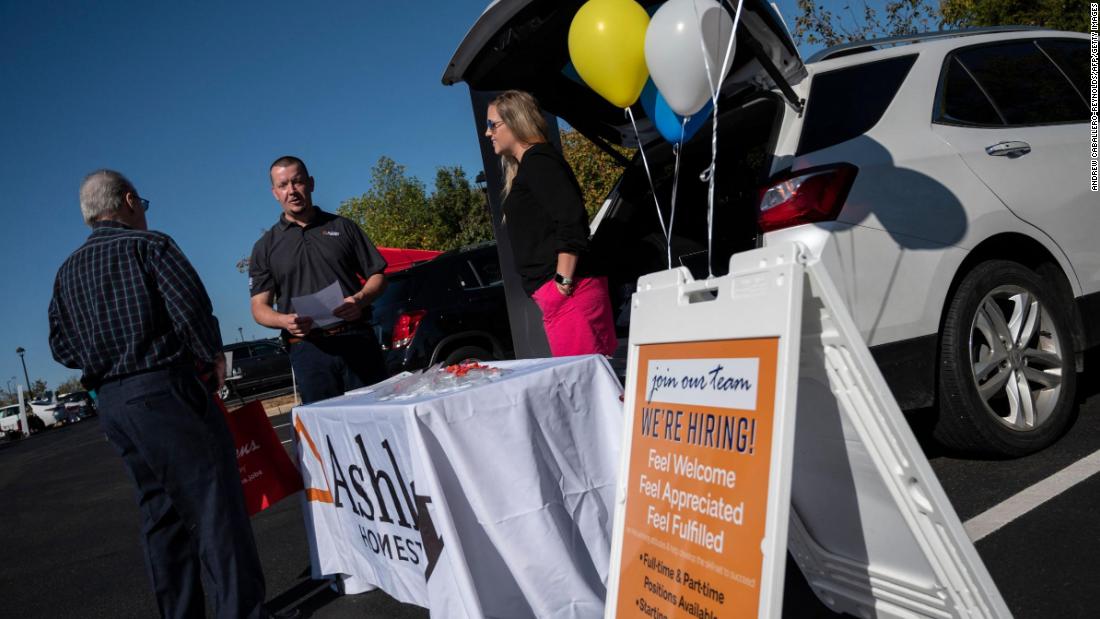
A version of this story appeared in CNN's What Matters newsletter. To get it in your inbox, sign up for free here.
(CNN)If you're confused by the US economy, which simultaneously shows signs of strength and cause for concern, you're not alone.
The economy is on the road to recovery from the coronavirus pandemic, reeling from inflation or a source of disappointment on jobs creation, depending on who you're talking to.
It's probably all three, and what happens from month to month seems to be something of a surprise. That element of unpredictability might be the most normal possible thing given the shock of the pandemic -- the extraordinary government intervention to save the economy is unlike anything anybody alive today has ever seen.
It's hard to decide how important any single thing is.
Let's look today at jobs.
Government data released Friday showed the US economy gained 210,000 jobs in November and the unemployment rate fell to 4.2%. A low rate traditionally signals full employment, meaning that nearly everyone who wants a job has one.
And yet!
Most stories about the November jobs report described it as "disappointing" in the first sentence, but also proof that the pandemic recovery is moving along.
Why the disappointment? Tappe wrote: "Economists had expected more than double the number of jobs created in November, forecasting a continuation of the buoyant economic recovery over the past two months. Instead, the November jobs gain was more reminiscent of the pre-pandemic economy, when employers added a smaller but steady number of positions, at least on the face of it."
At the same time, there's the good news. The jobs report suggests the pandemic recovery is progressing. The country has created more than 6 million jobs this year, and labor force participation increased to 61.8%, the highest level since the pandemic hit.
Much of the disappointment stems from expectations. The jobs report is based on two surveys -- one of businesses with payrolls and one of households about their economic situation -- that are conducted by the government mid-month and released by the Bureau of Labor Statistics in tandem on the first Friday of each month.
"Weird jobs numbers," tweeted Jason Furman, who led the Council of Economic Advisors during the Obama administration.
"Very strong household survey: unemployment down to 4.2% & labor force participation up as employment up 1.1 million," he tweeted. "But the normally more reliable payroll survey shows only 210K jobs added."
He's not sure what's going on: "Some explanations may emerge but it may just be measurement error."
Where do expectations come from? Leading up to the monthly release, economists and banks publish their own expectations for what the surveys will find. If the government data doesn't hit those expectations, disappointment follows.
I talked to Elise Gould, a senior economist at the Economic Policy Institute, about what we do and do not learn from these reports.
She said they need to be viewed as pieces of information, not the full picture, in part because the surveys can overstate things and miss the changing composition of the workforce.
Revisions to jobs reports from recent months have confirmed stronger job growth than what was shown by the surveys.
Still, it's best to know the latest information, even if we know it's likely to change, she said.
Also, the pandemic. There is also the pandemic element to confound economic expectations, just like it has confounded people's lives.
"Everyone in this economy today and the people that are making these predictions have never lived through a pandemic that hit the labor market so strong," said Gould. "And so their models are not necessarily capturing the ebbs and flows of the pandemic."
I asked David Goldman, managing editor of CNN Business, for his thoughts on why these reports seem to confound expectations each month. He came back with three points:
- This is a particularly unusual environment. It is making predictions really difficult for economists. The labor shortage, supply chain crisis, energy crunch, inflation and Covid-19 situations all wrapped into one make for a delicate balancing act. We should cut economists a break.
- Right in the long run. Economists actually have been proven correct over the past several months when they initially were thought to be wrong. That's because the reports keep getting revised higher in subsequent months as Labor Department economists get more data. It's not only hard for economists at Goldman Sachs and JPMorgan to figure out -- it's hard for the government, too.
- Don't focus on expectations. The forecasts aren't the important thing here -- it's the actual data. And one month doesn't a trend make. We've had some shockingly good jobs data in recent months, and November wasn't all that bad -- just not quite as good as we had expected.
There's uncertainty elsewhere. Leaders at the Federal Reserve, like Chairman Jerome Powell, had been preaching that inflation was temporary -- calling it "transitory," meaning it wouldn't permanently affect the economy.
But in a signal that inflation may last a little longer than expected, Powell told lawmakers this week the Fed may end some of its pandemic stimulus efforts -- they call it "tapering" -- earlier than expected.
"At this point the economy is very strong and inflationary pressures are high and it is therefore appropriate in my view to consider wrapping up the taper of our asset purchases ... perhaps a few months sooner," Powell said.
One wrench thrown into the economy has been the resilience of the coronavirus. We may not quite understand how the surge of the Delta variant over the summer and fall arrested progress.
CNN's Tappe and Nathaniel Meyersohn wrote about the Delta effect back in August.
Now that the Omicron variant is emerging, it, too, could send things in a new direction.
Nobody seems to know what's going on with the economy - CNN
Read More
No comments:
Post a Comment